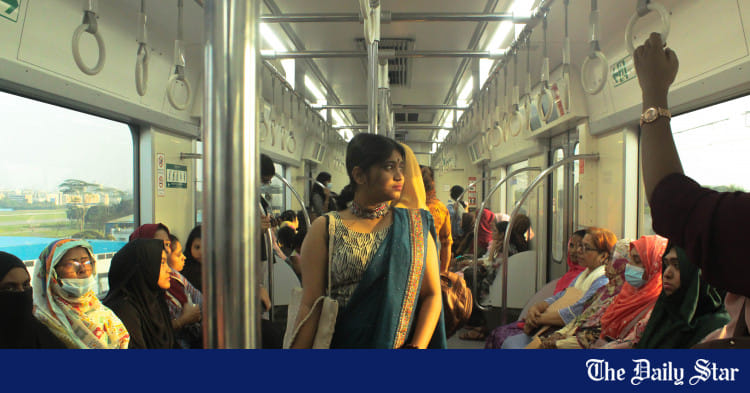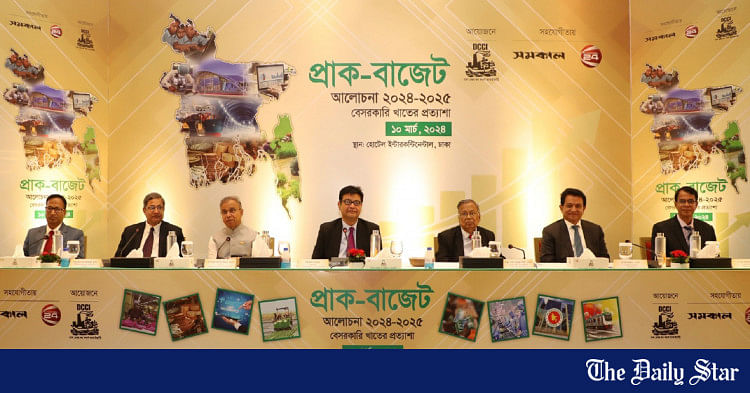Saif
Senior Member
- Joined
- Jan 24, 2024
- Messages
- 16,808
- Likes
- 8,152
- Nation

- Residence

- Axis Group


Do women need the separate metro rail carriage?
And what purpose does it serve?
Do women need the separate metro rail carriage?
While the reasons behind having a women-only compartment might seem obvious to most, the existence of this seemingly magical compartment remains shrouded in mystery for some others. FILE PHOTO: PRABIR DAS
On February 20, Facebook was flooded with posts about how unbelievably crowded a metro rail platform was that day. One post in particular gained viral attention, narrating how hordes of men flooded into the women's compartment during the crowded commute and refused to leave. The writer of the post took pleasure in sharing that, in response, the women in the compartment rallied together, blocking the gates during stops to teach the men a lesson. She enthusiastically described the wholesome sense of girl power and unity that pervaded the compartment that day. This viral post triggered hundreds of other discussions, primarily centred around the question: why is there a separate women's compartment? And what purpose does it serve? Certain metro rail commuters thought it was unfair that women get to have a separate compartment even during peak hours, when men don't.
While the reasons behind having a women-only compartment might seem obvious to most, the existence of this seemingly magical compartment remains shrouded in mystery for some others. Before delving into that, let's take a closer look at what unfolded that day. According to multiple accounts, the metro rail platform was exceptionally crowded due to a delayed train. In a last-minute announcement, it was specified that the very last compartment was designated for women when usually it is the first compartment.
In Bangladesh, as per a 2018 research study by BRAC, a staggering 94 percent of women utilising public transportation reported instances of verbal, physical, and other forms of harassment. The severity and prevalence of sexual harassment in public spaces is one of the key deterrents to women's equal participation in higher education and the labour force.
Initially, one might assume that the overcrowded setting led to confusion, with men inadvertently entering the women's carriage. However, as the train reached less crowded stations, and uncomfortable women (alongside the guards) requested the men to disembark or shift to other carriages, they adamantly refused to comply. The women in the compartment then resorted to blocking the gates and subsequently prevented the men from getting off at their stations. From that point onward, discussions unfolded regarding the perceived severity of the treatment these women imparted to the men that day. Some voiced their discontent, arguing that if the roles were reversed, men would not subject women to similar treatment. This debate eventually led to questioning the purpose of having a separate women's compartment.
In the online discourse, the separate compartment was painted as a privilege, prompting people to question why women, who are currently striving for equality, would desire such "special treatment." The conversation then expanded to include the debate about the need for designated seats for women on buses as well. Some argued that, in the past, men used to willingly offer their seats to women during crowded commutes, but this practice has dwindled as women now perceive themselves as equals to men.
But Bangladesh is not the only country to employ designated women's compartments in metro trains. In countries such as India, Indonesia, Japan, and Mexico, there are women-only spaces in trains. Countries such as the UAE have also taken initiatives to introduce pink taxis driven by women for female passengers in several cities. Some countries, such as Malaysia, also introduced women-only buses.
Creating these safe spaces for women is not restricted to public transport. One can find women-only community centres, banks, and clinics. "Safe space" is the keyword here as these places were not constructed to give women a leg up or provide them with an added privilege. What do the countries providing separate commuting spaces to women have in common? Women in all these countries face severe sexual harassment in public spaces and are victims of institutional discrimination.
In Bangladesh, as per a 2018 research study by BRAC, a staggering 94 percent of women utilising public transportation reported instances of verbal, physical, and other forms of harassment. The severity and prevalence of sexual harassment in public spaces is one of the key deterrents to women's equal participation in higher education and the labour force. In Bangladesh, buses have for long designated seats for women at the front, not with the assumption that women are less capable of standing but because standing in these crowded buses makes them more vulnerable to sexual harassment. Even then, these reserved seats are frequently disregarded by male passengers with little to no retaliation from other passengers. And, unfortunately, even with these designated spaces in place, women were found to be vulnerable to sexual harassment in buses predominantly occupied by men.
This is why when the Dhaka metro rail was inaugurated, and it was announced that a whole carriage would be reserved for women, relief seemed to spread among female commuters. Reports of women who typically relied on Uber rides or CNG-run auto-rickshaws for added safety now opting for the metro rail were common. However, the allure of this dedicated space is slightly diminished due to improper enforcement, as men continue to breach the designated compartment.
Access to safe public transportation and simply being in public without the fear of harassment constitute a fundamental human right, often denied to women in Bangladesh. In this context, the women-only compartment on the metro rail serves as a sanctuary, offering women a sense of security. Those who might have refrained from travelling due to fear of harassment now find solace in this designated "safe space." It's not an added privilege, but a necessity for ensuring women's basic rights.
So, let's ask ourselves this question: in 2024, do women still need a separate compartment on the Dhaka metro rail? In an ideal world, the answer would be "no." Not only does sex segregation of this sort not reflect privilege for women, it actually reflects gender inequality. However, in Bangladesh, where gender inequality and safety concerns for women persist, having a designated compartment is a step towards ensuring inclusivity of women in public spaces. On this International Women's Day, let's actively reinforce the presence of these existing "safe spaces" for women in our community to foster inclusivity.
Tasnim Odrika is a biochemist and a writer.



